Kids with ADHD are a challenge to parent and require extra attention but are easily loved! Behavioral strategies that work with other kids may not be helpful for children with ADHD. Since kids with ADHD frequently require a great deal of time and energy, their parents often report being exhausted by the end of the day and may not have the inclination to read about the newest interventions to help their child. Fortunately, there is an alternative: audiobooks. Listen to an audiobook while you are going for a walk, driving in your car, or cooking dinner. It’s a great way to learn more about kids with ADHD and the most effective parenting strategies to help these children succeed.
Our team of neuropsychologists, school psychologists, and psychology students at South County Child and Family Consultants is committed to searching the Internet and beyond to find reputable, informative, and practical tools to help parents, children, and teens. We look for the best information online to help kids diagnosed with ADHD, Learning Disabilities, executive-functioning difficulties, struggles with Social Emotional Learning (SEL) skills, autism, depression, and anxiety, among others, and provide you with information about how neuropsychological evaluations can help in targeting these concerns. Come back regularly, as the links are updated frequently with the most up-to-date resources available.
All About ADHD: A Family Resource for Helping Your Child Succeed with ADHD by Thomas W. Phelan, Ph.D
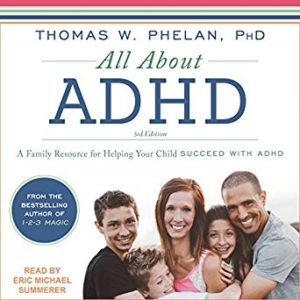
All About ADHD is a comprehensive guide to ADHD’s symptoms, diagnosis, and treatment in children and adults, including information such as: The basic symptoms of ADHD and their effects on school, work, home, and personal relationships. The differences in ADHD between boys and girls. Counseling, school interventions, behavior management, and social skills training
Written in easy-to-understand language and with a positive, treatment-focused approach, All About ADHD is a must-have resource for parents, teachers, physicians, and mental health professionals. (From Amazon.com audiobook review)
Focused: ADHD & ADD Parenting Strategies for Children with Attention Deficit Disorder by Blythe Grossberg, Psy.D
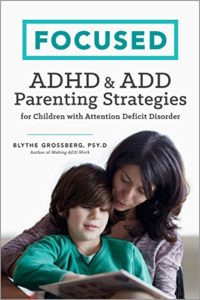
- A concise overview of attention deficit disorder in children and their different treatment options
- Over 40 parenting strategies targeting common ADHD challenges like hyperactivity and inattention
- Modification tips for adapting strategies to your child’s unique needs
- Helpful tools like a quiz and worksheets to supplement your ADHD treatment plan
- Valuable parenting principles and advice for becoming your child’s best advocate (From Amazon.com audiobook review)
Parenting Children With ADHD: 10 Lessons That Medicine Cannot Teach, Second Edition (LifeTools: Books for the General Public) by Vincent J. Monastra, Ph.D
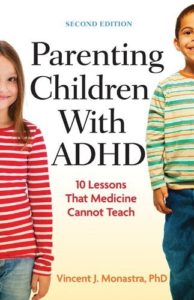
Over the past 30 years, Dr. Monastra has treated more than 15,000 clients who have ADHD. In this indispensable book he shares the knowledge he has gained. Engaging and straightforward, the book is directed at parents of children who have, or might have, ADHD. In a conversational style, Monastra offers a series of sequential lessons, beginning with the causes of ADHD and the most common medical treatments. He discusses all the relevant issues for parents, including psychological treatment, diet, educational laws, and practical coping strategies for both parents and children. (From Amazon.com audiobook review)
What Your ADHD Child Wishes You Knew: Working Together to Empower Kids for Success in School and Life by Dr. Sharon Saline
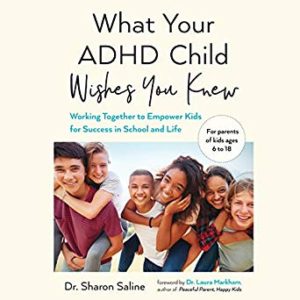
You’ve read all the expert advice, but despite countless efforts to help your child cope better and stay on track, you’re still struggling with everyday issues like homework, chores, getting to soccer practice on time, and simply getting along without pushback and power struggles.
What if you could work with your child, motivating and engaging them in the process, to create positive change once and for all? In this insightful and practical book, veteran psychologist Sharon Saline shares the words and inner struggles of children and teens living with ADHD – and a blueprint for achieving lasting
success by working together. (From Amazon.com audiobook review)
8 Keys to Parenting Children with ADHD (8 Keys to Mental Health) by Cindy Goldrich
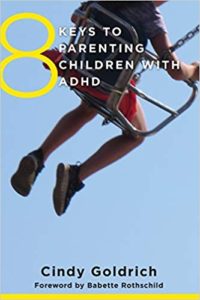
Parenting children with ADHD, whether diagnosed or undiagnosed, can be challenging and complex. But just as a child who struggles with reading can learn to decode words, children with ADHD can learn patience, communication, and solution-seeking skills to become more confident, independent, and capable. This book, rich with optimism, tips, tools, and action plans, offers science-based insights and systems for parents to help cultivate these skills. 8 Keys to Parenting Children with ADHD focuses on developing and strengthening effective interpersonal skills in both parents and children as a way to improve conflict resolution. (From Amazon.com audiobook review)
Taking Charge of ADHD, Third Edition: The Complete, Authoritative Guide for Parents by Russell A. Barkley, Ph.D
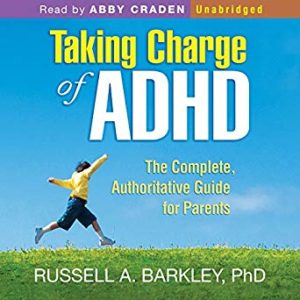
From distinguished researcher/clinician Russell A. Barkley, this treasured parent resource gives you the science-based information you need about attention-deficit/hyperactivity disorder (ADHD) and its treatment. It also presents a proven eight-step behavior management plan specifically designed for six- to 18-year-olds with ADHD.
Offering encouragement, guidance, and loads of practical tips, Dr. Barkley helps you: Make sense of your child’s symptoms, Get an accurate diagnosis, Work with school and health-care professionals to get needed support, Learn parenting techniques that promote better behavior, Strengthen your child’s academic and social skills, Use rewards and incentives effectively, and Restore harmony at home.
(From Amazon.com audiobook review)
Parenting: Processing Speed
Kids who have difficulty with processing speed require extra support on tasks and activities where other children might not. They may take a little bit longer to understand what is being asked of them or complete seemingly mindless tasks. Parents of these children can feel run down and exhausted with the extra attention it takes to help them complete their work and chores. Fortunately, there are many helpful suggestions that do not require extra time and silence. Stay up to date on the latest parenting strategies and interventions with audiobooks! You can listen in the car or while working out or cooking dinner, the possibilities are endless. It’s a great way to learn more about kids who have problems with processing speed and the most effective parenting strategies to help these children succeed.
Our team of neuropsychologists, school psychologists, and psychology students at South County Child and Family Consultants is committed to searching the Internet and beyond to find reputable, informative, and practical tools to help parents, children, and teens. We look for the best information online to help kids diagnosed with ADHD, Learning Disabilities, executive-functioning difficulties, struggles with Social Emotional Learning (SEL) skills, autism, depression, and anxiety, among others, and provide you with information about how neuropsychological evaluations can help in targeting these concerns. Come back regularly, as the links are updated frequently with the most up-to-date resources available.
Bright Kids Who Can’t Keep Up: Help Your Child Overcome Slow Processing Speed and Succeed in a Fast-Paced World by Ellen Braaten, Ph.D, and Brian Willouchby, Ph.D
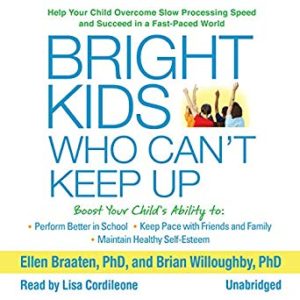
Do you find yourself constantly asking your child to “pick up the pace”? Does he or she seem to take longer than others to get stuff done – whether completing homework, responding when spoken to, or getting dressed and ready in the morning? Filled with vivid stories and examples, this crucial resource demystifies processing speed and shows how to help kids (ages five to 18) catch up in this key area of development. (From Amazon.com audiobook review)
The Smart but Scattered Guide to Success: How to Use Your Brain’s Executive Skills to Keep Up, Stay Calm, and Get Organized at Work and at Home by Peg Dawson, Ed.D, and Richard Guare, Ph.D
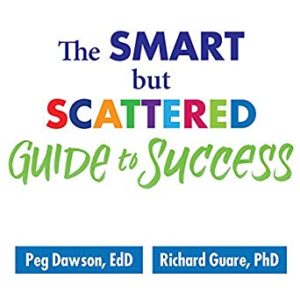
Are you smart, scattered, and struggling? You’re not alone. Cutting-edge research shows that today’s 24/7 wired world and the growing demands of work and family life may simply max out the part of the brain that manages complex tasks. That’s especially true for those lacking strong executive skills – the core brain-based abilities needed to maintain focus, meet deadlines, and stay cool under pressure. (From Amazon.com audiobook review)
Differently Wired: Raising an Exceptional Child in a Conventional World by Deborah Reber
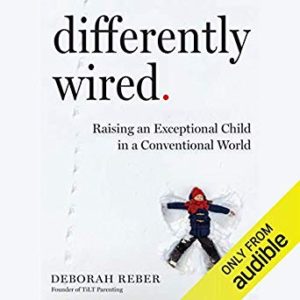
Today millions of kids are stuck in a world that doesn’t respect, support, or embrace who they really are – these are what Deborah Reber is calling the “differently wired” kids, the one in five children with ADHD, dyslexia, Asperger’s, giftedness, anxiety, sensory processing disorder, and other neurodifferences. Their challenges are many. But for the parents who love them, the challenges are just as hard – struggling to find the right school, the right therapist, the right parenting group while feeling isolated and harboring endless internal doubts about what’s normal, what’s not, and how to handle it all.
On the one hand it’s a book of saying NO, and how it’s time to say no to trying to fit your round-peg kid into society’s square holes, no to educational and social systems that don’t respect your child, no to the anxiety and fear that keep parents stuck. And then it’s a book of YES. By offering 18 paradigm shifts – what she calls “tilts” – Reber shows how to change everything. How to “Get Out of Isolation and Connect.” “Stop Fighting Who Your Child Is and Lean In.” “Let Go of What Others Think.” “Create a World Where Your Child Can Feel Secure.” “Find Your People (and Ditch the Rest).” “Help Your Kids Embrace Self-Discovery.” And through these alternative ways of being, discover how to stay open, pay attention, and become an exceptional parent to your exceptional child. (From Amazon.com audiobook review)
Parenting: Screen Time
With today’s modern technology, it is quite easy to fall victim to our screens. Our children are constantly engaged with screens at home and in school and always seem to be on computers or tablets or watching television. Our society has become dependant on these screens in order to function effectively. But how much screen time is too much, and how can we set boundaries for our kids? Fortunately, we have compiled the most relevant resources available to share with you on how to set appropriate limits on screen time. We know how hectic the life of a parent can be, so all of the following resources are in audiobook format. You can listen in the car or while working out or cooking dinner, the possibilities are endless. It’s a great way to learn more about screen time and the most effective parenting strategies to help our children succeed.
Our team of neuropsychologists, school psychologists, and psychology students at South County Child and Family Consultants is committed to searching the Internet and beyond to find reputable, informative, and practical tools to help parents, children, and teens. We look for the best information online to help kids diagnosed with ADHD, Learning Disabilities, executive-functioning difficulties, struggles with Social Emotional Learning (SEL) skills, autism, depression, and anxiety, among others, and provide you with information about how neuropsychological evaluations can help in targeting these concerns. Come back regularly, as the links are updated frequently with the most up-to-date resources available.
Playing Smarter in a Digital World: A Guide to Choosing and Using Popular Video Games and Apps to Improve Executive Functioning in Children and Teens by Randy Kulman, Ph.D.
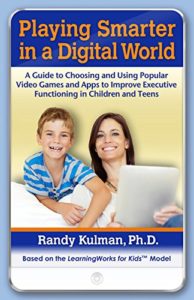
A book to help parents to make their children’s digital playtime educational.
Digital play, when used appropriately, can be a powerful tool for learning skills such as planning, time management, cooperation, creativity, and digital literacy. The book’s clearly articulated strategies help parents use digital media in a more effective manner and, at the same time, set effective limits and implement a healthy “play diet” for their children. A section devoted to exploring specific strategies for using digital media with children in specific populations—such as children affected by ADHD, autism spectrum and learning disorders, and other mental health and educational issues—is also featured, as is a list of specific games, apps, and tools to make game-based learning most effective.
Screenwise: Helping Kids Thrive (and Survive) in Their Digital World by Devorah Heitner, Ph.D
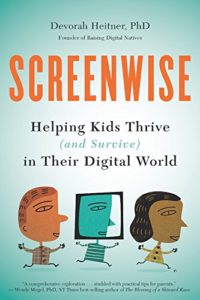
Screenwise offers a realistic and optimistic perspective on how to thoughtfully guide kids in the digital age. Many parents feel that their kids are addicted, detached, or distracted because of their digital devices. Media expert Devorah Heitner, however, believes that technology offers huge potential to our children-if parents help them. Using the foundation of their own values and experiences, parents and educators can learn about the digital world to help set kids up for a lifetime of success in a world fueled by technology. (From Amazon.com audiobook review)
Wired Child: Reclaiming Childhood in a Digital Age by Richard Freed, Ph.D
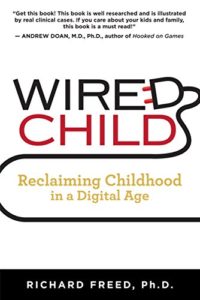
Wired Child gives you the confidence and skills you need to safely navigate your children through a rapidly shifting media landscape. Dr. Freed offers concrete parenting strategies that will help you create the strong family kids need and encourage their school success. You’ll also learn how to protect kids from destructive tech addictions, and instead guide them to use technology productively as a positive force for their future. (From Amazon.com audiobook review)
Reset Your Child’s Brain: A Four-Week Plan to End Meltdowns, Raise Grades, and Boost Social Skills by Reversing the Effects of Electronic Screen-Time by Victoria L. Dunckley, MD
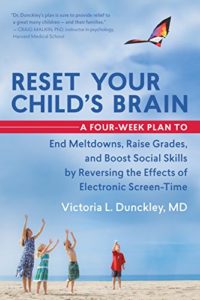
Offered now in this book, this simple intervention can produce a life-changing shift in brain function and help your child get back on track — all without cost or medication. While no one in today’s connected world can completely shun electronic stimuli, Dr. Dunckley provides hope for parents who feel that their child has been misdiagnosed or inappropriately medicated, by presenting an alternative explanation for their child’s difficulties and a concrete plan for treating them. (From Amazon.com audiobook review)
Disconnected: How To Reconnect Our Digitally Distracted Kids by Thomas Kersting
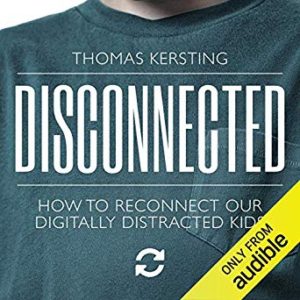
In Disconnected, renowned psychotherapist and longtime school counselor Tom Kersting explores the device-dependent world our children live in and how it is impacting their mental and emotional well-being.Kersting provides simple strategies to help reduce screen time as well as a host of meditative and mindfulness techniques to help our kids reclaim their brains, and their lives. (From Amazon.com audiobook review)
Parenting: Teenagers
Parenting a teenager is not easy and can be confusing, especially if this is your first child to reach this age. Parenting teens is vastly different from what you may have been used to when your child was younger. We know how hectic the life of a parent can be, so all of the following resources are in audiobook format. You can listen in the car or while working out or cooking dinner, the possibilities are endless. It’s a great way to learn more about parenting teens and the most effective parenting strategies to help our teens succeed.
Our team of neuropsychologists, school psychologists, and psychology students at South County Child and Family Consultants is committed to searching the Internet and beyond to find reputable, informative, and practical tools to help parents, children, and teens. We look for the best information online to help kids diagnosed with ADHD, Learning Disabilities, executive-functioning difficulties, struggles with Social Emotional Learning (SEL) skills, autism, depression, and anxiety, among others, and provide you with information about how neuropsychological evaluations can help in targeting these concerns. Come back regularly, as the links are updated frequently with the most up-to-date resources available.
Smart but Scattered Teens: The”Executive Skills” Program for Helping Teens Reach Their Potential by Richard Guare, Ph.D, Peg Dawson, Ed.D, and Colin Guare
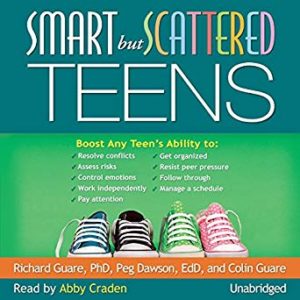
If you’re the parent of a “smart but scattered” teen, trying to help him or her grow into a self-sufficient, responsible adult may feel like a never-ending battle. Now you have an alternative to micromanaging, cajoling, or ineffective punishments. This positive guide provides a science-based program for promoting teens’ independence by building their executive skills – the fundamental brain-based abilities needed to get organized, stay focused, and control impulses and emotions. (From Amazon.com audiobook review)
The Teenage Brain: A Neuroscientist’s Survival Guide to Raising Adolescents and Young Adults by Frances E. Jensen, M.D., with Amy Ellis Nutt
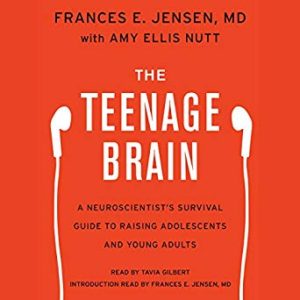
Drawing on her research, knowledge, and clinical experience, internationally respected neurologist–and mother of two boys–Frances E. Jensen, MD, offers a revolutionary look at the adolescent brain, providing remarkable insights that translate into practical advice for both parents and teenagers. (From Amazon.com audiobook review)
Untangled: Guiding Teenage Girls Through the Seven Transitions into Adulthood by Lisa Damour, Ph.D
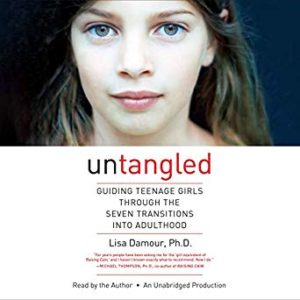
In this sane, highly engaging, and informed guide for parents of daughters, Dr. Damour draws on decades of experience and the latest research to reveal the seven distinct – and absolutely normal – developmental transitions that turn girls into grown-ups, including parting with childhood, contending with adult authority, entering the romantic world, and caring for herself. Providing realistic scenarios and welcome advice on how to engage daughters in smart, constructive ways, Untangled gives parents a broad framework for understanding their daughters while addressing their most common questions, including:
My 13-year-old rolls her eyes when I try to talk to her and only does it more when I get angry with her about it. How should I respond?
Do I tell my teen daughter that I’m checking her phone?
My daughter suffers from test anxiety. What can I do to help her?
Where’s the line between healthy eating and having an eating disorder?
My teenage daughter wants to know why I’m against pot when it’s legal in some states. What should I say?
My daughter’s friend is cutting herself. Do I call the girl’s mother to let her know?
From Amazon.com audiobook review)
How to Talk So Teens Will Listen and Listen So Teens Will Talk by Adele Faber and Elaine Mazlish
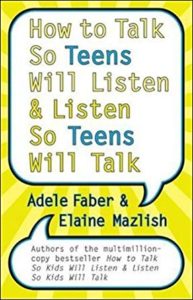
Filled with straightforward advice and written in their trademark, down-to-earth style sure to appeal to both parents and teens, this all-new volume offers both innovative, easy-to-implement suggestions and proven techniques to build the foundation for lasting relationships. From curfews and cliques to sex and drugs, it gives parents the tools to help their children safely navigate the often stormy years of adolescence. (From Amazon.com audiobook review)
Parenting: Children
Parents have many questions that arise while parenting their younger children and wonder where to get the most reliable and helpful information available? Sifting through all the information on the Internet to find exactly what they are looking for can seem like an endless task. We know how hectic the life of a parent can be, so all of the following resources are in audiobook format. You can listen in the car or while working out or cooking dinner, the possibilities are endless. It’s a great way to get some of your questions answered and learn about the most effective parenting strategies to help our children succeed.
Our team of neuropsychologists, school psychologists, and psychology students at South County Child and Family Consultants is committed to searching the Internet and beyond to find reputable, informative, and practical tools to help parents, children, and teens. We look for the best information online to help kids diagnosed with ADHD, Learning Disabilities, executive-fFunctioning difficulties, struggles with Social Emotional Learning (SEL) skills, autism, depression, and anxiety, among others, and provide you with information about how neuropsychological evaluations can help in targeting these concerns. Come back regularly, as the links are updated frequently with the most up-to-date resources available.
How to Talk So Kids Will Listen & Listen So Kids Will Talk by Adele Faber and Elaine Mazlish
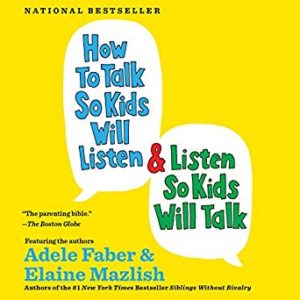
Now, this best-selling classic includes fresh insights and suggestions as well as the author’s time-tested methods to solve common problems and build foundations for lasting relationships, including innovative ways to:
Cope with your child’s negative feelings, such as frustration, anger, and disappointment
Express your strong feelings without being hurtful
Engage your child’s willing cooperation
Set firm limits and maintain goodwill
Use alternatives to punishment that promote self-discipline
Understand the difference between helpful and unhelpful praise
Resolve family conflicts peacefully
(From Amazon.com audiobook review)
No-Drama Discipline: The Whole-Brain Way to Calm the Chaos and Nurture Your Child’s Developing Mind by Daniel J. Siegel, M.D., and Tina Payne Bryson, Ph.D
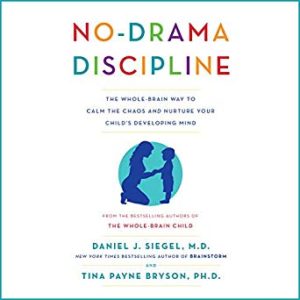
Defining the true meaning of the “d” word (to instruct, not to shout or reprimand), the authors explain how to reach your child, redirect emotions, and turn a meltdown into an opportunity for growth. By doing so, the cycle of negative behavior (and punishment) is essentially brought to a halt, as problem solving becomes a win/win situation. (From Amazon.com audiobook review)
The Explosive Child: A New Approach for Understanding and Parenting Easily Frustrated, Chronically Inflexible Children by Ross W. Greene, Ph.D
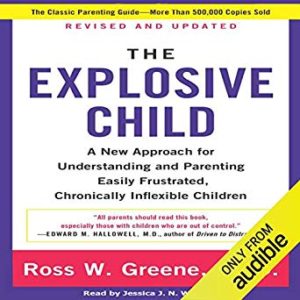
Throughout this compassionate, insightful, and practical book, Dr. Greene provides a new conceptual framework for understanding their difficulties, based on research in the neurosciences. He explains why traditional parenting and treatment often don’t work with these children, and he describes what to do instead. Instead of relying on rewarding and punishing, Dr. Greene’s “Collaborative Problem Solving” model promotes working with explosive children to solve the problems that precipitate explosive episodes, and teaching these kids the skills they lack. (From Amazon.com audiobook review)
The Whole-Brain Child: 12 Revolutionary Strategies to Nurture Your Child’s Developing Mind, Survive Everyday Parenting Struggles, and Help Your Family Thrive by Daniel J. Siegel, M.D.
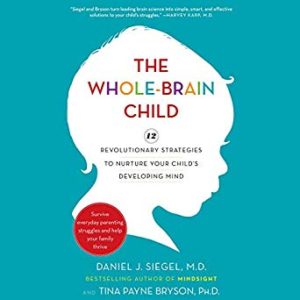
In this pioneering, practical book, Daniel J. Siegel, neuropsychiatrist and author of the best-selling Mindsight, and parenting expert Tina Payne Bryson offer a revolutionary approach to child rearing with 12 key strategies that foster healthy brain development, leading to calmer, happier children. The authors explain – and make accessible – the new science of how a child’s brain is wired and how it matures. The “upstairs brain,” which makes decisions and balances emotions, is under construction until the mid-20’s. And especially in young children, the right brain and its emotions tend to rule over the logic of the left brain. No wonder kids throw tantrums, fight, or sulk in silence. By applying these discoveries to everyday parenting, you can turn any outburst, argument, or fear into a chance to integrate your child’s brain and foster vital growth. (From Amazon.com audiobook review)
Receive online class information and helpful tips from Dr. Randy Kulman's LearningWorks for Kids |



